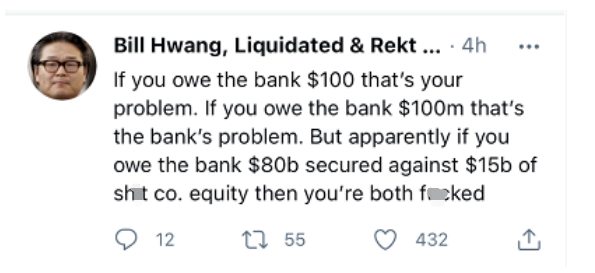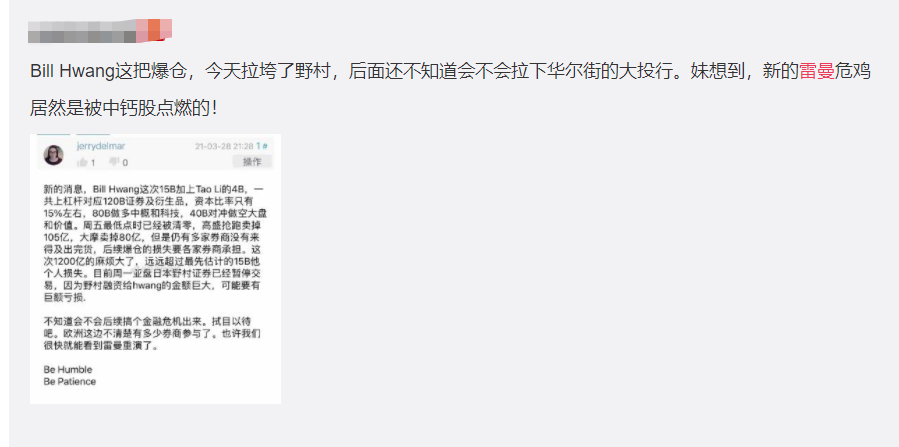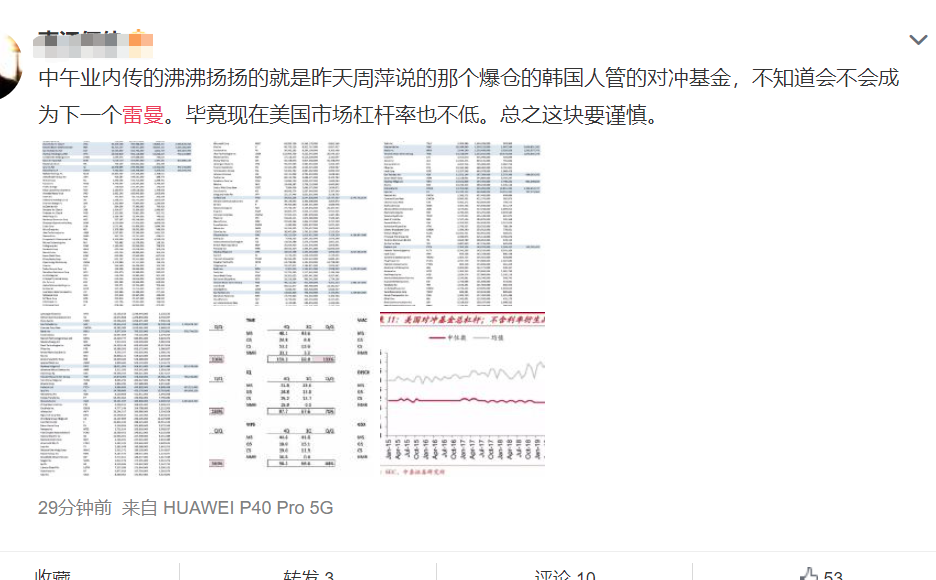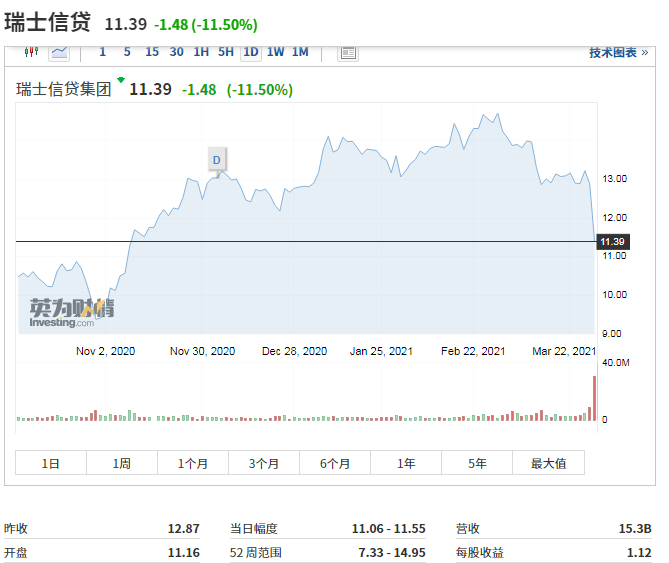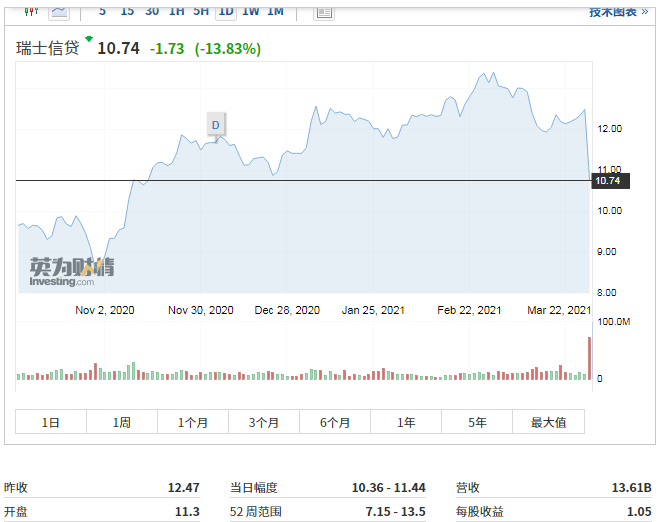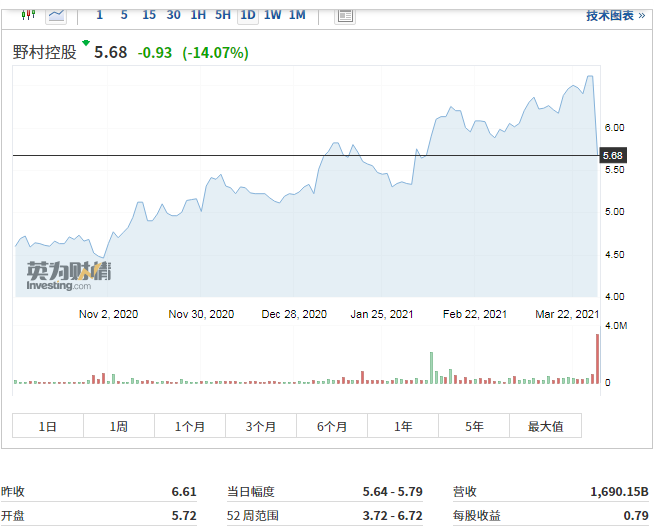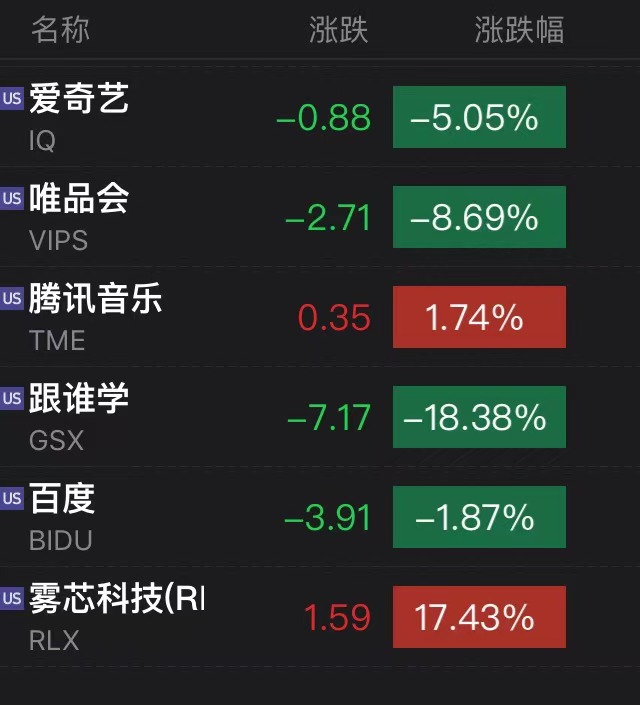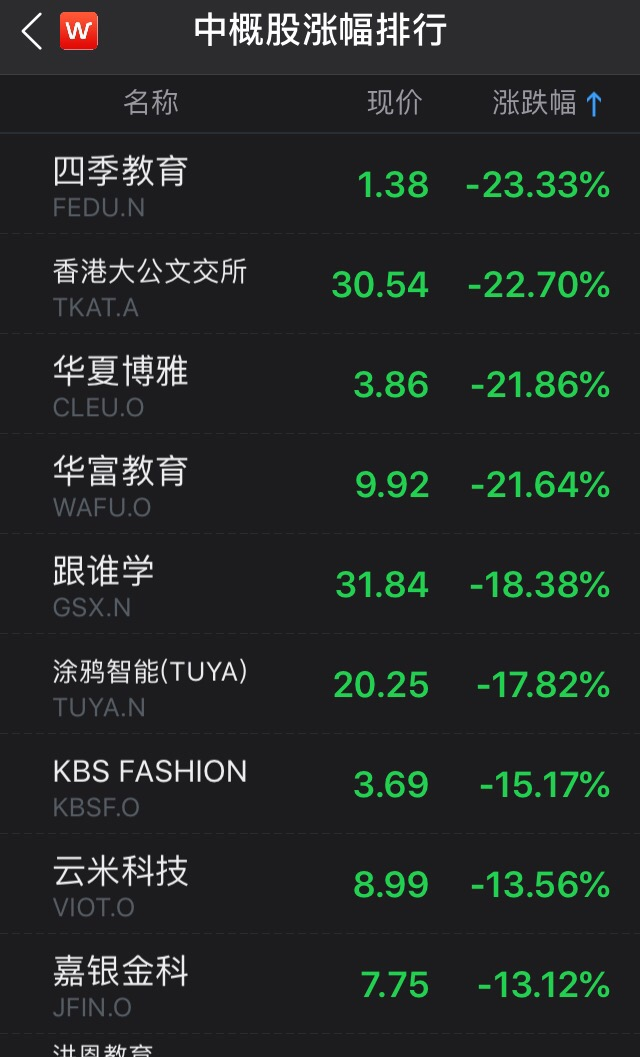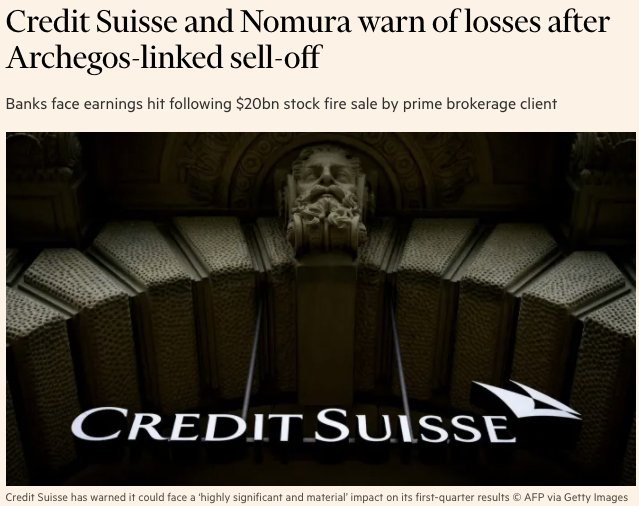The sell-off may continue, and the next “Lehman crisis” will appear?
Editor’s note: This article is from the WeChat public account “Daily Economic News” (ID: nbdnews), editor: Cheng Peng, Lu Xiangyong, Xiao Yong, Du Hengfeng, proofreader: Xia Zhijian.
Recently, a Korean used a Japanese brokerage to trade Chinese stocks on American stock markets and got into trouble. This person is Bill Hwang. He created the record of “the largest single-day loss in human history”.
Last Friday (March 26), US media reported that the high-leverage fund Archegos Capital managed by hedge fund manager Bill Hwang (Korean) broke its position. Its heavy holdings include Viacom (VIAC) and DISCA. , GSX, Tencent Music, Baidu, Wuxin Technology, etc. The fund’s holdings were sold for a total of US$19 billion last week. Due to high leverage, the market value of related stocks has evaporated by US$33 billion, or about 215.9 billion yuan.
Among them, Goldman Sachs sold $10.5 billion, while Morgan Stanley executed a sell-off of more than $8 billion.
Bill Hwang said on social media on the 29th that if you owe the bank $80 billion to guarantee $15 billion in stocks, then you two are done.
On Monday (March 29), Nomura Holdings, Japan’s largest securities company, stated that one of its US subsidiaries may have suffered “significant” losses due to transactions with a US client. Based on market prices as of March 26, the subsidiary’s claims against customers are estimated to be approximately US$2 billion (approximately RMB 13 billion).
On the same day, “Daily Economic News” learned that the Swiss financial regulator FINMA said on Monday that it had received a notice from Credit Suisse that it had participated in an international hedge fund incident involving multiple banks. The agency said: “FINMA is aware of this international hedge fund case (involving multiple banks and international locations). FINMA has received notification from the bank and is contacting it.”
From Nomura to Credit Suisse, more and more facts have shown that this is not only a case of huge fund losses, but also involves many investment banks and brokerages. In extreme cases, it may further evolve into “triggering financial crisis.” Leveraged black hole”.
Many netizens said, will this matter become a new Lehman crisis?
The Dow hit a record high, and many stocks in the liquidation storm plunged again
The Biden administration rarely mentions the stock market, but at midday on Monday, March 29, local time, White House spokesperson Jen Psaki revealed that the Biden administration is paying close attention to the stock market.
Jen Psaki said on Monday that the Biden administration is closely monitoring Monday’s stock market decline. In addition, Psaki also reaffirmed that Biden will announce plans to rebuild US infrastructure on Wednesday. Stimulated by the news, the three major stock indexes went short-term, and the Dow rose in response.
Earlier, the “hedge fund liquidation incident” suppressed market sentiment, and the three major stock indexes fell across the board. The liquidation of Archegos Capital also attracted the attention of the US Securities and Exchange Commission (SEC). The SEC said on Monday that it is closely monitoring developments.
As of the close, the three major U.S. stock indexes had mixed ups and downs. The Dow rose nearly a hundred points to hit an intraday and closing record high. The S&P and Nasdaq still ended in decline.
The major U.S.-listed bank stocks all fell, becoming one of the biggest downward driving forces for the U.S. stock market on Monday. Credit Suisse U.S. stocks fell more than 11%, Deutsche Bank U.S. stocks and Wells Fargo fell more than 3%, and Morgan Stanley fell more than 2%. %, Citi fell nearly 2%, JP Morgan Chase fell more than 1%, Bank of America fell more than 0.9%, and Goldman Sachs fell more than 0.5%.
Credit Suisse also fell sharply at the opening of the Swiss Stock Exchange, down 13.83% as of the close.
Nomura U.S. stocks fell more than 14%, and Tokyo-listed Nomura Japanese stocks plunged 16% on Monday.
Affected by the Archegos liquidation, the two North American media stocks, ViacomCBS and Discovery, which plummeted last Friday, closed down more than 6% and 1%, respectively. Chinese concept stocks Vipshop will fall by more than 8%, iQiyi by more than 5%, GSX, which closed more than 41% last Friday, has fallen by more than 18%, and has fallen by nearly 70% this month, and Baidu has fallen by nearly 2%. , Tencent Music rose more than 1%.
It is worth noting that, apart from GSX, other education stocks also fell. Four Seasons Education fell more than 23%, Huafu Education fell 21.64%, Tuya Smart fell 17.82%, Good Future fell 6.78%, and New Oriental fell more than 3%. %.
Foreign media: Credit Suisse is facing at least 19.7 billion pre-losses
The British “Financial Times” quoted two people close to Credit Suisse as saying that the (“Bill Hwang liquidation incident”) caused an estimated loss of US$3 billion to US$4 billion to Credit Suisse.Between US dollars (approximately RMB 19.7 billion to RMB 26.2 billion). Credit Suisse declined to comment. The Financial Times also quoted a person familiar with the relationship between Credit Suisse and Archegos Capital Management as saying that the losses caused by the incident to Credit Suisse were limited to its prime brokerage department in New York and did not extend to the bank’s wealth management business. .
Credit Suisse stated that it is too early to quantify the exact losses it faces, but said (the “Bill Hwang liquidation incident”) may have a “very significant impact” on the results of the first quarter ending this month. Credit Suisse added that the bank will provide further updates on the matter “in due course.”
In addition to the aforementioned Nomura and Credit Suisse, the “Financial Times” also quoted informed sources that Deutsche Bank (hereinafter referred to as Deutsche Bank) was also affected by the liquidation of Archegos Capital, but it is estimated that Deutsche Bank’s losses will be It’s just a small part of the losses suffered by other large investment banks. According to the person familiar with the matter, Deutsche Bank has hedged most of its exposure.
However, Bloomberg News quoted sources as saying that Deutsche Bank had agreed to withdraw from the prime brokerage business in 2019, but its asset transfer is still in progress, which exposes the bank to the “Bill Hwang liquidation incident.” Any potential losses from the holdings.
Some large Wall Street investment banks are prime brokers of Archegos Capital managed by Bill Hwang, and these investment banks process Archegos Capital transactions and lend cash and securities to the fund. As the market reported that Archegos Capital had a liquidation on Friday (March 26) Eastern Time, Morgan Stanley, Goldman Sachs and Deutsche Bank quickly sold a large number of shares held by Archegos Capital late last week. Many industry insiders are deeply puzzled as to why Nomura did not sell related stocks last Friday.
May be related to the “Bill Hwang liquidation” storm, Morgan Stanley, Goldman Sachs, UBS, and Deutsche Bank are also involved
The “Daily Economic News” noted that earlier this month, Credit Suisse announced the reorganization of its asset management business and suspended bonuses for senior managers. Since the British supply chain finance company Greensill Capital collapsed, as Greensill’s main source of funds, Credit Suisse had to consider compensating investors who were hit by the collapse of Greensill.
“Financial Times” report screenshot
The Financial Times cited sources familiar with the matter as saying that in addition to Nomura, Credit Suisse and Deutsche Bank mentioned above, Goldman Sachs, Morgan Stanley and Swiss Bank (hereinafter referred to as UBS) provide prime brokerage services to Archegos Capital. ). But Morgan Stanley, Deutsche Bank and UBS declined to comment.
As of press time, it is not clear to the outside world whether Morgan Stanley and UBS were affected by the “Bill Hwang liquidation incident.” However, according to the “Wall Street Journal”, in recent days, the “Bill Hwang liquidation incident” triggered a position liquidation worth nearly $30 billion.
Transaction data show that last Friday, due to the “Bill Hwang liquidation incident”, Goldman Sachs liquidated US$10.5 billion worth of stocks in a single day. That day, the market value of some leading stocks, including technology giants and media groups, evaporated. 35 billion U.S. dollars. Before the opening of the U.S. stock market that day, Wall Street Investment Bank sold $6.6 billion worth of shares in Baidu, Tencent Music, and Vipshop. Subsequently, shares of ViacomCBS, Discovery Channel, and Farfetch Ltd flowed out of $3.9 billion.
The “Daily Business News” reporter noticed that in fact, as early as 2012, Bill Hwang reached a settlement with U.S. regulators on allegations of illegal transactions, and was banned from trading in Hong Kong, China in 2014. Since then, some banks have banned all transactions with Bill Hwang globally.
As for a number of Chinese concept stocks that fell sharply last Friday, whether it was caused by the blowout of hedge fund manager Bill Hwang’s Archegos Capital. On the afternoon of March 28, Beijing time, a reporter from the “Daily Business News” once asked Bill Hwang himself. Send a comment request email, but as of the time of publication, it has not received any form of reply.
The sell-off may continue. Is the next “Lehman crisis” about to appear?
Currently, the market’s concern is-how serious is the selling crisis? As more and more brokers issue emergency margin calls, how far will the clearing chain extend?
The Financial Times reported on the 28th that some traders believe that, judging from the shape of this selling wave, it reached its climax last Friday and may have basically ended. At the same time, some traders believe that from the scale of Archegos Capital’s leverage, there may be billions of dollars worth of positions to be liquidated.
According to “International Finance News”, Anlan Capital’s executive director Chen Da said in an interview with reporters that the liquidation of the Archegos Fund should not have ended, but it has come to an end. “A foundation makes a differenceOf the brokers to serve, Goldman Sachs is one of them, and the other is Nomura. The Archegos Fund’s positions in Nomura are all at a loss, because the liquidation has caused Nomura to lose the amount of leverage lent to the Archegos Fund. Goldman Sachs may have better risk control or higher liquidation line requirements. Maybe there are still some remaining positions after the Archegos Fund liquidation. In any case, the liquidation behavior should continue, but the main position should have reached the end of the liquidation.” /p>
At present, the domino effect caused by Bill Hwang’s liquidation has caused the market to worry about whether a new Lehman crisis will break out.
Chen Da believes that Lehman’s volume is much larger, and that Lehman had a large number of derivatives positions at the time, and the risk exposure was much greater than this time. There is no comparison. “So I don’t think there will be too much Big follow-up chain reaction”.
In addition, according to China Business News, “Tiger Fund mainly likes to buy technology, media and consumption. At present, it should be a local impact, and the impact will not be too great.” Senior global macro hedge fund manager Yuan Yuwei told reporters.
Situ Jie, a senior U.S. stock trader, also told reporters, “The impact should be limited, but it is still unknown how other hedge funds are leveraged, and if they are generally so large.”
Who is Bill Hwang?
In fact, Bill Hwang is not an unknown person, but an investment tycoon who has been involved in the Hong Kong stock market ten years ago.
According to the China Fund News, Bill Hwang is the lover of Julian Robertson, the founder of the Tiger Fund. He was once in charge of the Tiger Asia Fund. It is the Asian branch of the Tiger Fund. It was established in 2001 and specializes in managing funds in China, Japan and Korea. For stock investment, its employees are all based in New York, and there is no substantial business operation in Hong Kong, China. The insider trading case involved in the Tiger Asia Fund occurred in late 2008 and early 2009. The fund sold H shares of Bank of China and China Construction Bank twice through insider trading, and profited from it.
According to the details disclosed by the Hong Kong Securities Regulatory Commission, in the illegal transactions involving Bank of China’s H shares, the Tiger Asia Fund was notified in advance and was invited to participate in UBS and Royal Bank of Scotland on December 31, 2008 and 2009, respectively. Two allotments of H shares of Bank of China were conducted on January 13, 2008, and the details of the two allotments and price-sensitive information were learned. Tiger Asia Fund agreed at the time that it would not conduct Bank of China H shares trading after receiving the information. However, before UBS placed the Bank of China on December 31, 2008, Tiger Asia Fund had pre-sold 104 million H shares of Bank of China, and the market estimated that it made a profit of 8.6 million Hong Kong dollars from it.
On January 13, 2009, the Tiger Asia Fund did the same, shorting 256 million shares of Bank of China before the Royal Bank of Scotland placed H shares of Bank of China, but it was estimated that the loss was about
